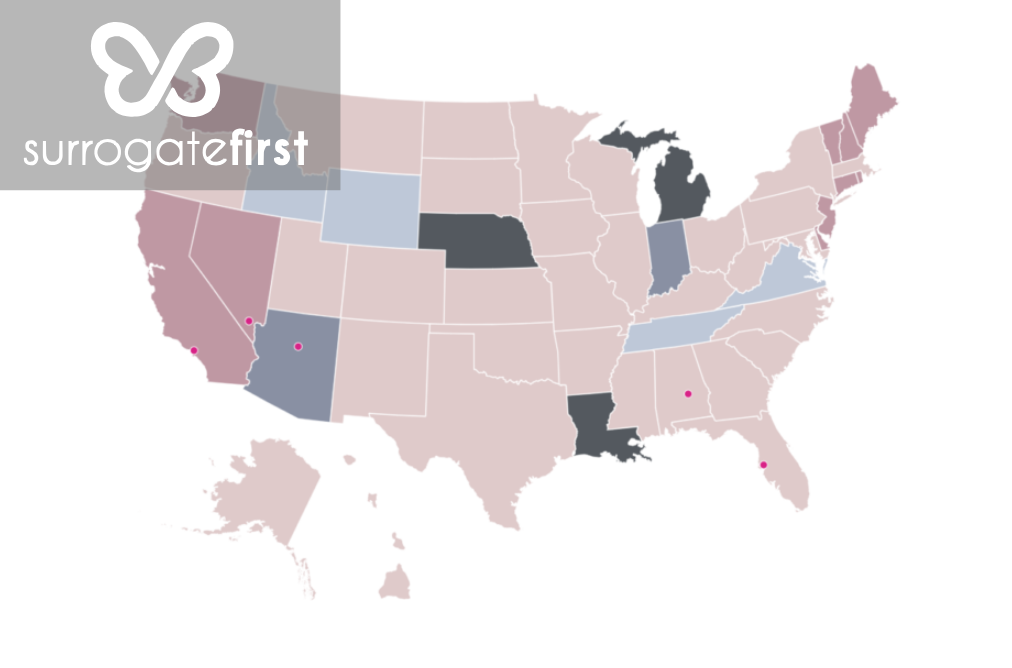Surrogacy is a life-changing journey that allows intended parents to grow their families and gives surrogates the opportunity to help make dreams come true. However, navigating surrogacy law in the US can be complex. Laws vary from state to state and, in some cases, even within counties. This guide breaks down surrogacy legality across the United States as of 2025, helping you understand where surrogacy is fully legal, conditionally permitted, or prohibited.
States Where Surrogacy is Fully Legal in 2025
Some states make the surrogacy process smooth and accessible for both intended parents and surrogates. These states permit surrogacy for all parents without restrictions. More specifically, pre-birth orders are granted throughout these states, ensuring that both intended parents are named on the birth certificate.
Key States Where Surrogacy is Fully Legal:
- California
- Colorado
- Connecticut
- Delaware
- Maine
- New Hampshire
- New Jersey
- Nevada
- Vermont
- Washington
- Massachusetts: Surrogacy has been permitted by case law, but the Massachusetts Parentage Act will officially legalize it statewide starting January 1, 2025.
- Michigan: While compensated surrogacy contracts are currently illegal, a new statute will take effect in the spring of 2025, making surrogacy fully legal.
In these states, intended parents can confidently proceed with the surrogacy process knowing their legal rights are protected.
States Where Surrogacy is Legal With Conditions
On the other hand, in some states, surrogacy is legal but comes with specific conditions. These conditions may include requirements related to the marital status or residency of the intended parents or surrogate. Additionally, whether a parentage order is issued pre-birth or post-birth can depend on the state or even the specific county.
Examples of Conditional States:
- New York: At least one parent and the surrogate must be residents of New York.
- Rhode Island: One of the intended parents must be a U.S. resident.
- Wyoming: Both parents must reside in Wyoming.
In some cases, non-genetic parents may need to go through post-birth adoption procedures to secure their parental rights and be listed on the birth certificate. Intended parents in these states should consult a reproductive attorney to navigate these conditions.
States Where Surrogacy Laws Are Unclear or Complex
Certain states have ambiguous or inconsistent surrogacy laws. While surrogacy is practiced in these areas, legal hurdles may arise, and the outcome can depend on local courts or specific circumstances.
States with Complex Surrogacy Laws:
Additionally, there are states where surrogacy contracts are void and unenforceable by statute, even though surrogacy arrangements are practiced:
If you are considering surrogacy in one of these states, it’s crucial to work with a knowledgeable reproductive lawyer who understands how to navigate these legal challenges.
States Where Surrogacy is Prohibited
Finally, in a few states, surrogacy is explicitly prohibited by law. These states either ban compensated surrogacy contracts or impose strict limitations that make it difficult for both intended parents and surrogates to proceed.
Key Example:
- Louisiana: In most cases, compensated surrogacy is considered a criminal act. While uncompensated journeys may be allowed, the process is heavily restricted.
However, if you live in a state where surrogacy is prohibited, don’t lose hope. Many intended parents choose to work with surrogates from surrogacy-friendly states to overcome these barriers.
What to Do If You Live in a State With Surrogacy Restrictions
For intended parents living in states with surrogacy restrictions, there are options, such as:
- Work with surrogates from surrogacy-friendly states. Many surrogacy agencies specialize in matching intended parents with surrogates in states where the process is fully legal. You can find all the details the full surrogacy map of the US here.
- Consider alternative legal paths. In some cases, uncompensated surrogacy or interstate arrangements may be an option.
For surrogates, it’s important to understand the laws in your state. If compensated surrogacy is prohibited, you may still have the option of participating in an altruistic surrogacy journey.
The Role of Reproductive Lawyers in Navigating Surrogacy
Surrogacy law in the US can be complicated, which is why enlisting the help of a reproductive lawyer is essential. These legal professionals ensure that the surrogacy process complies with state-specific laws and helps protect the rights of all parties involved. You can find the recommended surrogacy practitioners by clicking on each state.
How Reproductive Lawyers Can Help:
- Drafting and Negotiating Contracts: A lawyer will ensure that the surrogacy agreement meets all legal requirements and protects the rights of both intended parents and surrogates.
- Coordinating Hospital Birth Plans: Legal professionals work with hospitals to ensure a smooth delivery process, including obtaining powers of attorney.
- Securing Parentage Orders: Lawyers assist in obtaining pre- or post-birth orders to establish the intended parents’ legal rights.
Conclusion
Surrogacy law in the US is constantly evolving, and understanding the legal landscape is crucial for a successful surrogacy journey. Whether you live in a state where surrogacy is fully legal, legal with conditions, or prohibited, there are pathways to grow your family or support others in their parenthood dreams.
If you are not sure how to navigate those, you might want to seek the help of experienced legal professionals and surrogacy agencies, so you can meet these complexities with confidence.
About SurrogateFirst
SurrogateFirst is a boutique surrogate agency specializing in quickly matching intended parents around the world with our fully-vetted, exceptional surrogates.
We help individuals and couples, regardless of race or sexual orientation, build their families through the miracle of surrogacy.
Every team member at SurrogateFirst is either a former intended parent or an experienced surrogate herself. We also have first-hand knowledge of what it takes to have an incredible, successful surrogate journey.







